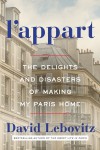19
Followers
19
Following
M Sarki
Besides being a poet with four collections published, M Sarki is a painter, film maker, and photographer. He likes fine coffee and long walks.
M Sarki has written, directed, and produced six short films titled Gnoman's Bois de Rose, Biscuits and Striola , The Tools of Migrant Hunters, My Father's Kitchen, GL, and Cropped Out 2010. More details to follow. Also the author of the feature film screenplay, Alphonso Bow.
Currently reading
L'Appart: The Delights and Disasters of Making My Paris Home
We Learn Nothing: Essays
Elmet: LONGLISTED FOR THE MAN BOOKER PRIZE 2017
Limbo, and Other Places I Have Lived: Short Stories
The Double Life of Liliane
At Home with the Armadillo
American Witness: The Art and Life of Robert Frank
Autumn
Inside Out: A Personal History of Pink Floyd (Reading Edition)
American Witness: The Art and Life of Robert Frank
A Man's Place
 http://msarki.tumblr.com/post/110662839508/a-mans-place-by-annie-ernaux
http://msarki.tumblr.com/post/110662839508/a-mans-place-by-annie-ernauxThis story rings so true for me, and though it may actually be false, and a complete fiction, it feels honorable, and is a fitting tribute written to give birth again to the spirit of Annie Ernaux’s dead dad. Let’s clear the air and admit there are negative traits aplenty, our own included. But how can you paint a picture of a man (or woman) without them? It is impossible without the appearance of pretense or deceit. This book is far too authentic and well-written for that to happen.
I believe this story is most likely best appreciated by those of us who have been, or at least have experienced first-hand, life on both sides of the railroad tracks. Being aware that one faction of your birth parents had suffered the ignominy of poverty helps as you are being drawn to a life of literature, art, and culture they had no way of knowing for themselves. A Man’s Place parallels in ways my own history of being a grandson of a courageous Finnish immigrant who came as a young man on his own to the United States in search of opportunity. I am privy to the sad details my father has shared of his growing up on a farm cut out of sand hills and scrub forest in a community in northern Michigan called Alabaster. The hard and cruel life his father had to endure, due to his broken English and foreign ways, as he labored for wages as a gypsum miner in the local quarries. My paternal family was even said by certain locals to have come from the wrong side of the tracks, but I appreciate my paternal family to no end, though it pains me to consider the ridicules a hard life of poverty endures.
Annie Ernaux presents in good taste the spirit, both broken and soaring, of her father and how important it was to him that his daughter have and enjoy a better life than he. Though he would never truly understand or know for himself exactly what was involved in her acquiring this higher learning and class, he was glad for her but hid his pride from the other townsfolk lest it showed himself in less than humble good light. The difficulties of her father’s life Ernaux aptly portrayed, and it seems fair to me how she revisited her memory of that time and what it might have meant to specifically herself and her father.
The opening of the book centers on the death of her father and how she and her mother prepared his dead body for public viewing and the funeral service and burial to follow. It was a touching portrait of a daughter’s love for a man she had not much to say to in the end, but who lived as if all of life mattered. Regarding negative claims or questions made against the all-too-personal Ernaux, from what I have gathered from reading some of her other books, Annie saves her most revealing and shameful portraits to be focussed primarily on herself.







